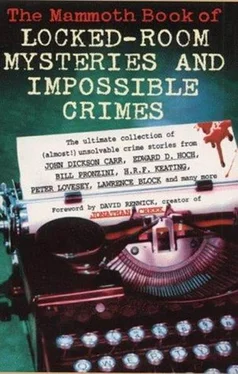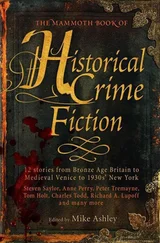Mike Ashley - The Mammoth Book of Locked-Room Mysteries And Impossible Crimes
Здесь есть возможность читать онлайн «Mike Ashley - The Mammoth Book of Locked-Room Mysteries And Impossible Crimes» весь текст электронной книги совершенно бесплатно (целиком полную версию без сокращений). В некоторых случаях можно слушать аудио, скачать через торрент в формате fb2 и присутствует краткое содержание. Жанр: Детектив, на английском языке. Описание произведения, (предисловие) а так же отзывы посетителей доступны на портале библиотеки ЛибКат.
- Название:The Mammoth Book of Locked-Room Mysteries And Impossible Crimes
- Автор:
- Жанр:
- Год:неизвестен
- ISBN:нет данных
- Рейтинг книги:3 / 5. Голосов: 1
-
Избранное:Добавить в избранное
- Отзывы:
-
Ваша оценка:
- 60
- 1
- 2
- 3
- 4
- 5
The Mammoth Book of Locked-Room Mysteries And Impossible Crimes: краткое содержание, описание и аннотация
Предлагаем к чтению аннотацию, описание, краткое содержание или предисловие (зависит от того, что написал сам автор книги «The Mammoth Book of Locked-Room Mysteries And Impossible Crimes»). Если вы не нашли необходимую информацию о книге — напишите в комментариях, мы постараемся отыскать её.
A new anthology of twenty-nine short stories features an array of baffling locked-room mysteries by Michael Collins, Bill Pronzini, Susanna Gregory, H. R. F. Keating, Peter Lovesey, Kate Ellis, and Lawrence Block, among others.
The Mammoth Book of Locked-Room Mysteries And Impossible Crimes — читать онлайн бесплатно полную книгу (весь текст) целиком
Ниже представлен текст книги, разбитый по страницам. Система сохранения места последней прочитанной страницы, позволяет с удобством читать онлайн бесплатно книгу «The Mammoth Book of Locked-Room Mysteries And Impossible Crimes», без необходимости каждый раз заново искать на чём Вы остановились. Поставьте закладку, и сможете в любой момент перейти на страницу, на которой закончили чтение.
Интервал:
Закладка:
The explosion sounded far louder than it really was. It came from a card shop near Oxford Circus and terrified everyone within earshot. The plate glass window became a thousand deadly missiles that shot across the road. Cards were scattered everywhere. Those in the “Get Well Soon” rack were the first to ignite. Women screamed, men yelled, residents lifted bedroom windows or came dashing out of front doors. The two constables abandoned their shopping and ran towards the scene of the blast, one of them raising the alarm on his mobile while the other warned bystanders to keep well clear of the danger area. It seemed only minutes before police cars converged on Oxford Circus to investigate the crime and to control the gathering crowd. A fire engine arrived soon afterwards with an ambulance on its tail. The noise was deafening.
It was a scene that was repeated elsewhere in the city. A second bomb went off in the Euston Road, a third near Victoria Station and a fourth in Baker Street. No sooner had the emergency services reached one devastated area than another explosion was heard. Nor were the bombs confined to central London. Blackfriars, Belvedere, Chingford, Whitechapel, Pentonville, Clapham Common, Greenwich and other sites were targeted. The Metropolitan Police were at full stretch, the Fire Service pushed to the limit. Chaos reigned for hour after hour. The one consolation was that there seemed to be very few casualties.
At the height of the crisis, the biggest explosion of all went off in an electricity sub-station and the whole of the West End was suddenly blacked out. Panic spread uncontrollably. Older inhabitants were reminded all too vividly of the Blitz, younger people were convulsed with fear. Everyone rushed around wildly, wondering what was happening. A foreign invasion? A bombing campaign by Irish dissidents? A visit by aliens? The end of the world? It was only when dawn finally lifted the blanket of night that another crime was uncovered, a theft so shocking that it was totally impossible to believe even though the evidence was there for all to see.
Lord Nelson had been stolen from atop his column in Trafalgar Square. In his place, usurping his position of honour, gazing down Whitehall with a smile of triumph and outraging every true English patriot, was a huge statue of Napoleon Bonaparte.
Fluttering at his boots was a self-explanatory banner.
VIVE LA FRANCE!
Commander Richard Milton was not pleased to be hauled back from his holiday. His week in Cornwall had been curtailed before it had even begun and he was determined to make someone pay for his loss. With his wife’s complaints still ringing in his ears, he was flown back swiftly to London to take charge of an inquiry that was dominating the media like the outbreak of the Third World War. A tall, thin, angular man with a face like a Victorian poisoner, Dick Milton had the experience, the guile and the stamina to lead a large team of detectives in the investigation of what appeared to be a series of interrelated crimes. He got results. That was why he was chosen. When he worked in harness with his old friend, Detective Inspector Kenneth Hurrell, results tended to come quickly.
An incident room was set up in Scotland Yard. By the time that Milton came charging in, Hurrell had already been busy for hours.
“What the hell is going on, Ken?” demanded Milton.
“I wish I knew,” sighed Hurrell. “A series of bombs went off all over London last night. Soft targets. Extensive damage to property. Minor injuries but no fatalities. And then – this other bombshell!”
“Nelson can’t have disappeared !”
“He has, Commander.”
“How?”
“That’s the bit we haven’t worked out.”
“And is it true that someone else is up there?”
“Napoleon Bonaparte.”
“Bloody hell!”
“The media are calling it a national scandal.”
“And that’s exactly what it is, Ken!” said Milton vengefully. “My holiday’s been ruined. Nothing could be more scandalous than that. I had strips torn off me when I left St Ives. You try telling your wife that she’ll have to manage without you while you go off in search of Nelson.”
“I’m not married, sir.”
“Be grateful. At times like this, celibacy is a blessing.”
“I didn’t say I was celibate.”
Kenneth Hurrell grinned. He was a wiry man of medium height with wavy black hair that was the envy of his colleagues. His immaculate suit made Minton’s tweed jacket look positively shabby. The Commander became businesslike. He snapped his fingers.
“How far have you got?”
“This far,” said Hurrell, moving to the large wall map. “The pins indicate the locations of the bombs. Twenty-one in all.”
“Twenty-one! What did they think it was – Bonfire Night?”
“Oh, no. They were very precise about the date.”
“What do you mean?”
“It’s October 21st.”
“So?”
“The date of the Battle of Trafalgar.”
“But that was years ago, Ken.”
“A hundred and ninety-five years. October 21st, 1805.”
“Is that relevant?”
“Extremely, sir. Some people obviously have long memories. The pattern of bombing proves that.” He jabbed a finger at the map. “At first, I thought they were just random explosions to create a diversion and move every available officer well away from the vicinity of Nelson’s Column.”
“And they’re not?”
“No,” said Hurrell. “Take this one here, for instance,” he continued, touching one of the pins. “Old Bethnal Green Road. The bomb was very close to Nelson Gardens. Then there’s this one, sir.” He indicated another pin. “On the site of Greenwich Market. Close to Nelson Road.”
“Could just be a coincidence.”
“Not when it happens in every case,” argued Hurrell. “There was a bomb near Nelson Walk in Limehouse, another on Morden Road, close to the Nelson Industrial Estate and a third in Nelson Yard, off Mornington Crescent. So it goes on.”
“What about Oxford Street and Victoria Station?” asked Minton. “I don’t recall any Nelson Roads in those areas.”
“There aren’t any.”
“So the pattern is incomplete.”
“Far from it, Commander. The explosion in Oxford Street was less than forty yards from the ‘Admiral Nelson’ pub. The one in Victoria Station was directly opposite ‘The Trafalgar’. No question about it, I’m afraid. We’re dealing with a case of aggravated revenge.”
“Some militant Frogs?”
“All the signs point that way.”
“So it seems.”
“You can’t fault their timing.”
“Timing?”
“Yes, sir. Until last week, workmen were at the top of the column to give Nelson his habitual clean-up. The thieves didn’t just get away with the most famous statue in London. They waited until all the bird shit had been scraped off it. We’re up against pros.”
“No phone calls from them?”
“Just one, sir. In French.”
“What was the message?”
“Short and sweet. We were ordered to leave him where he is.”
“Who?”
“The Emperor Napoleon.”
“Ruling the roost in Trafalgar Square!” exclaimed Milton with an upsurge of patriotism. “We’ll see about that! Nobody gives me orders, especially in Frogtalk. Come on, Ken. Clap on full sail. We’re going straight over to Trafalgar Square. You can fill me in on the way. Leave him there indeed!” He gave a snort of defiance. “We’ll have the bugger down off that column before he can say ‘Not tonight, Josephine.’”
Napoleon Bonaparte had drawn a vast audience. Though the police had cordoned off Trafalgar Square itself, all the approach roads were heaving with sightseers. Every window which overlooked the column had its own private audience. Television cameras had prime positions and sent their pictures to the watching millions. Driven to the scene of the crime, Dick Milton was furious when he caught sight of a French television crew.
Читать дальшеИнтервал:
Закладка:
Похожие книги на «The Mammoth Book of Locked-Room Mysteries And Impossible Crimes»
Представляем Вашему вниманию похожие книги на «The Mammoth Book of Locked-Room Mysteries And Impossible Crimes» списком для выбора. Мы отобрали схожую по названию и смыслу литературу в надежде предоставить читателям больше вариантов отыскать новые, интересные, ещё непрочитанные произведения.
Обсуждение, отзывы о книге «The Mammoth Book of Locked-Room Mysteries And Impossible Crimes» и просто собственные мнения читателей. Оставьте ваши комментарии, напишите, что Вы думаете о произведении, его смысле или главных героях. Укажите что конкретно понравилось, а что нет, и почему Вы так считаете.










